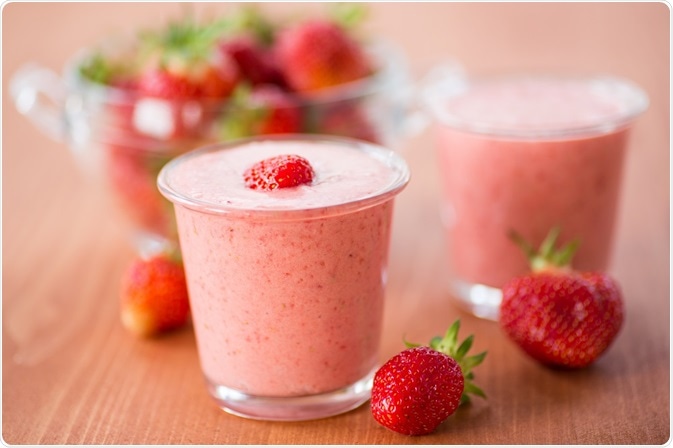Juicing is a process whereby juice is removed from fruits and vegetables by different methods such as pressing or squeezing it out, while discarding the pulp and skin.

Credit: Peredniankina/Shutterstock.com
Blending a fruit or vegetable is just homogenizing the whole, fiber and all, retaining all of the edible parts of the food.
Studies have shown that consuming blended drinks leads to a higher availability of antioxidants and other active chemicals in the plant food than is possible with juicing the same fruits, namely apples, pears, mandarin oranges and persimmons. The dietary concentration of polyphenols has also been shown to be inversely proportional to chronic disease.
Studies of juice fasting
In two randomized controlled studies, the effects of consuming commercial fruit and vegetable puree drinks were explored to explore , following both acute and chronic consumption.
Despite an increase in dietary ascorbic acid levels, the study found that the pureed drinks did not alter levels of ascorbic acid in blood plasma.
In addition, oxidative stress and antioxidant levels were not found to be altered to any significant degree, though another study showed a marked increase in plasma antioxidant activity following a three-month consumption of 16 ounces of carrot juice every day.
Juice cleansing is a different process, concerned with the concept of detoxifying the body by limiting consumption to only fruit or vegetable juices for three to ten days and fasting from solid foods. More aggressive juice fasting is available in the form of commercial preparations, which lasts only a day.
Pros of juice fasting
Nutrient content
It is well known that most adults in Western countries eat less than the recommended portions of fruit and vegetables, so intermittent juice fasting could be very beneficial.
In addition, the bioavailability of vitamin C, flavonoids and other useful phytochemicals is increased by juicing. When over 5 fruits and vegetables are consumed in the form of juice over a period of eight hours or more, it increases both dietary and plasma phytochemical, micronutrient and antioxidant activity.
Metabolic effects of juice fasting
Juice fasting causes some changes in body metabolism. Initially the LDL level increases following the onset of fasting, but then decreases. Triglycerides are mobilized during fasting to supply energy to the body, perhaps in response to changes in the insulin levels.
There is a reduction in total cholesterol which lasts for about a week after fasting. Acute and prolonged fasting may, however, result in a semi-starvation state which actually stimulates the body to conserve its fat stores and inhibit activity.
Vitamin C promotes fatty acid oxidation by moving long chain fatty acids across the mitochondrial membrane. In addition, vitamin C prevents endothelial injury due to lipid peroxidation.
Effects of juice fasting on chronic health conditions
Honey, which is added to many juice drinks, has been shown to lower blood lipids as well. All these may prevent cardiovascular, inflammatory, neurologic and neoplastic processes, if carried on over a long period. However, the lack of nutritional balance precludes the long-term sustainability of such a measure.
Again, fermentable fiber is high in fruit and vegetables, conferring prebiotic activity on them. A high fiber intake is known to be linked to reduced risk of cardiovascular disease, as well as of type 2 diabetes and some cancers. Moreover, oligosaccharides in the fiber are substrates for intestinal microbes which produce both energy and other potentially beneficial compounds such as short-chain fatty acids (SCFAs).
Cons of juice fasting
Blood sugar levels
Pureed juice drinks contain a lot of sugar, in the form of glucose, and lack fiber. This leads to many individuals feeling hungrier than usual, as their blood sugar levels spike and then drop. This, in turn, can lead to weight gain.
Blood sugar spikes can cause brief spurts of energy followed by slumps, manifesting as tiredness, headaches, and irritability. High blood sugar levels lead to stiffening of the red cell membrane, which hinders their passage through the body, increasing cholesterol deposits in the blood. Thus both hyperglycemia and hypertriglyceridemia may result from a long-term or too-regular fasting program.
However, if blended drinks are used, excess fiber may also be problematic, leading to excessive intestinal gas, bloating and abdominal cramps. To help avoid this, it is important that those on a blended fruit and vegetable diet should also drink sufficient water to help with proper stool formation.
Protein intake
The lack of protein in a juice fast may result in protein deficiency that can escalate in its effects if the juice fasting is carried on for any prolonged period.
Nut milk is therefore sometimes added into a juice fasting regimen to compensate for some (but not all) of the missing amino acids. Incomplete mixtures of amino acids are not beneficial to the body, however, as they cannot be built into complete proteins.
Many studies have shown that lack of protein leads to the person not feeling full, creating a psychological pressure to eat more. This is another theoretical weakness of the diet.
In addition to the temptation to eat something rich and filling, there is also a loss of muscle mass due to the protein deficit, which means that after the diet the weight is regained. Weight loss is due primarily to the loss of water and lacks longevity if not combined with more sustainable eating habits.
Anti-oxidant content
Finally, no scientific evidence shows that juice fasting actually leads to detoxification as this is normally done via the kidneys and liver, regardless of any juice diets undertaken.
Conclusion
The cons of juice fasting are the limited nutrient availability, high sugar intake and loss of muscle mass. However, the consumption of food and vegetable puree-based foods and drinks is a good way to add in these nutrients into the diet and promote overall cardiovascular health.
Further Reading
Last Updated: Oct 11, 2022